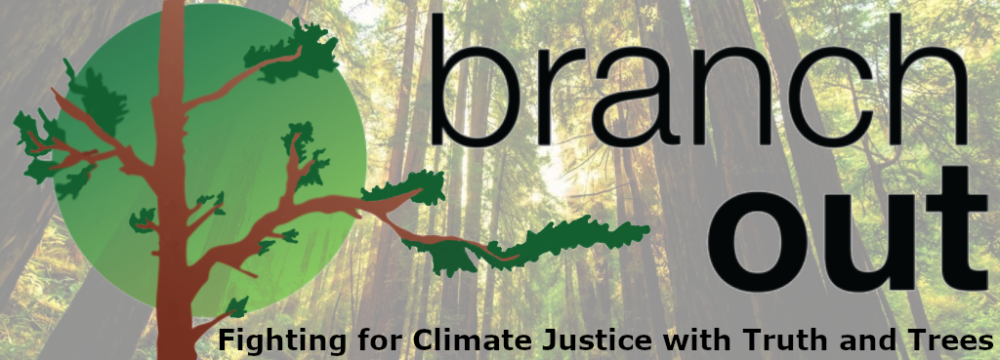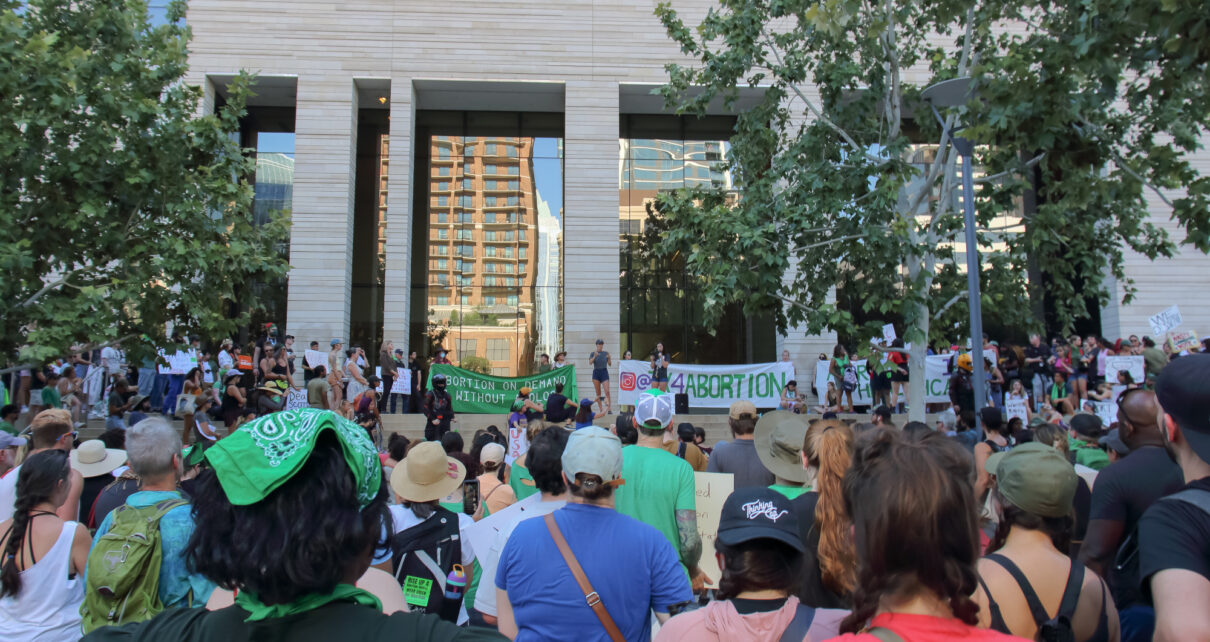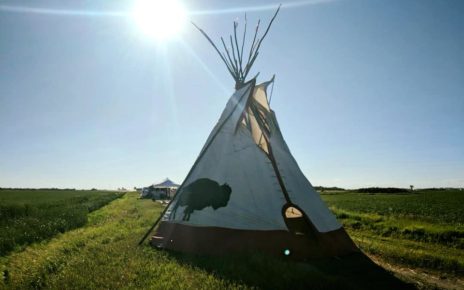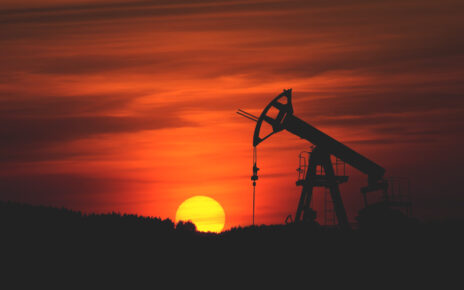“My daughter was dying inside of me and I had to go out of my way to find late-term abortion care at 21 weeks,” Kristen Herring, an intersectional feminist activist told participants at a reproductive rights rally outside the federal courthouse in Austin, Texas.
It was Friday, June 24th, 2022, and earlier that morning, the United States Supreme Court had overruled the landmark 1973 decision Roe v. Wade and the 1992 decision Parenthood v. Casey. Mississippi’s 15-week abortion ban sparked the latest Supreme Court ruling, Dobbs v. Jackson Women’s Health Organization, where the Court ruled that the right to access abortion care is not federally protected. With the 6-3 ruling by a conservative majority, nearly 50 years of established abortion rights across the nation were upended, directly impacting more than 135 million people.
Herring told her own story of having an unhealthy pregnancy and needing abortion care in order to save her own life in 2017. “They turned a healthcare procedure into a choice, a ‘choice’ that cost me $2700 and only 4 days to pay out of pocket because I wasn’t allowed to use my health insurance for this healthcare procedure.” She detailed the trauma she experienced navigating anti-choice laws and stigma five years ago, and how the Supreme Court decision threatens the lives of anyone in a situation similar to her story.
This monumental Supreme Court decision has taken away cis women’s, trans men’s and many nonbinary people’s rights to make decisions over their own bodies and access life-saving abortion care, leaving each individual state to decide the fate of its citizens. Many states, such as Texas, have passed “trigger laws” that will swiftly ban abortion care within weeks of the official ruling overturning Roe v. Wade.

“Once I heard the news, I was in disbelief,” said Jessie, a thirty-year-old resident of Corpus Christi, Texas, where a trigger law will go into effect 30 days from the ruling. “I thought, ‘this can’t be real, and I had to do something,’” she said at a reproductive rights rally as protestors screamed “My Body, My Choice!” all around her.
The group of six Republican-appointed Justices, however, are not the only thing impacting people’s reproductive health choices. Abortion care rights and access are also issues within the climate crisis. Now that abortion rights are threatened nationwide, marginalized communities that have always been on the frontlines of these fights are facing added pressure.
Pollution and Pregnancy
Heavy oil and gas refineries, military bases, and extractive industries all negatively impact the environment and surrounding communities. More often than not, these are poor communities and communities of color. According to various studies, many of those who live near environmental contaminants experience a higher inability to get pregnant, high rates of preterm labor and stillbirths if they are able to get pregnant in the first place, lung development issues for the fetus, as well as detrimental health concerns for the parent.
The same communities that are exposed to pollutants and other environmental disasters not only experience disproportionate reproductive issues, but they also typically have less access to life-saving abortion care. About 60% of folks who receive abortion care are Black and Brown people, who already undergo geographical hurdles and economic disparities in attaining these procedures.
Of those seeking abortion care in Mississippi, 74% are Black, even though they make up only 39% of the population. There is only one abortion care clinic in the entirety of this Southern state — Jackson’s Women’s Health Organization. In addition to having borne the brunt of pollution and limited abortion care access in Mississippi, the Black community is also negatively impacted by the extreme weather resulting from climate change. During Hurricane Ida in 2021, for instance, people of color were by far hit the hardest.
According to Dr. Robert Bullard, known as the “Father for Environmental Justice,” Black folks are less likely to own a car, making it extremely difficult to escape climate disasters, such as floods and hurricanes, and to drive to a clinic willing to offer abortion care.
Extreme Weather and Abortion Care Bans
Abortion care bans unfairly target the poor and working-class, as more privileged people can afford to take time off work and travel out of state in order to access abortion care. As trigger laws go into effect, we are likely to see increased travel at the same time that we desperately need to significantly reduce carbon emissions. While they are most shielded from the direct impacts of a changing climate, wealthy people are responsible for an excessive share of greenhouse gas emissions.
Unaffordable housing is another factor pushing poorer populations to places not only farther away from clinics, but also more prone to the increasing number of deadly wildfires. The 2017 California fires destroyed multiple clinics. Hurricane Harvey also forced clinics to shut down in 2017, and Hurricane Ida caused two of Louisiana’s three abortion care clinics to shutter in 2021. These climate change-induced catastrophes left folks around the country scrambling to get the care they urgently needed.
With climate collapse threatening the future, many people are having second thoughts about bearing children in the first place. In August of 2021, the IPCC released its starkest warning for humanity yet, stating that global temperatures are likely to surpass the 1.5 degree Celsius mark within two decades. This report warns of a bleak future, taking many people’s thoughts of children off the table.
Warmer temperatures, wildfires, floods, hurricanes, droughts, and other more intense natural disasters are wreaking damage on the mental health of young folks. In a recent study conducted in ten countries with 10,000 participants ages 16 to 25, 45% of those surveyed said that the climate crisis has “negatively affected their daily life and functioning.”
“It’s too unethical to bring a child into this world,” states Grace Doleshel, a young activist from Washington, who has made a pact with her partner not to have kids. “It’s basically setting the child up for an unhealthy life of physical and mental issues… I don’t ever want to subject someone to that if I don’t have to.”
“When so many people are struggling to take care of themselves not only mentally, but also with increasing economic disparities,” says Julia Nicholson, environmentalist and reproductive justice activist based in Texas, “forcing people to go through unwanted pregnancies is beyond cruel.”
Even for people who choose to start having children, climate change may actually harm people’s ability to reproduce. According to a UCLA study, “days with a mean temperature above 80 degrees Fahrenheit cause a large decline in birth rates 8 to 10 months later.” The study also presents evidence that warmer weather harms fertility and reproductive health.
Indigenous Communities on the Frontlines
Indigenous people have long respected the autonomy of childbirth and embraced abortion care and reproductive health options. Abortion care bans are yet another way the United States continues to erase the cultures and practices of Indigenous communities. At the same time, the experience Indigenous people have resisting U.S. government control provides perspective for the current moment.
Kristen Herring also spoke to this at the rally in Austin: “I’m Lumbee of the Lumbee Tribe in North Carolina and I remember the atrocities my family has had to live through and if they can go through that, I can live through this! We are here together fighting in solidarity and we are not alone!”
Now that abortion care access is severely dismantled across half the country, descendants of European settlers are now fighting to open abortion care clinics on Tribal lands, since they are Sovereign Nations. Indigenous abortion care rights advocates are noting how these white people are currently advocating for reproductive health facilities on Native land, even though they expressed no interest in supporting this before and currently show no motivation towards addressing the environmental and climate injustices Tribal Nations face.
Indigenous communities today are survivors of enslavement, abuse, murder, and genocide, as corporations still extract natural resources from Sacred land, destroy vital water management practices, and mistreat Native folks as commodities. There is also a large increase in sexual violence and Missing and Murdered Indigenous Women, girls and Two Spirit close to “man camps,” large company-owned housing units that are used by people who work in the oil fields. Indigenous Peoples have long known how sexist and patriarchal violence underlies the assault on Mother Earth, and the climate intersection of the recent abortion care ban only further demonstrates this dynamic.
The reproductive rights of cis women, trans men and nonbinary people across the country, predominantly poor people, communities of color, and Indigenous folks, are inextricably intertwined with the climate movement – and the fight for justice continues. If you or a loved one are able and willing to give, or if you are in need of reproductive care, check out abortionfunds.org.




